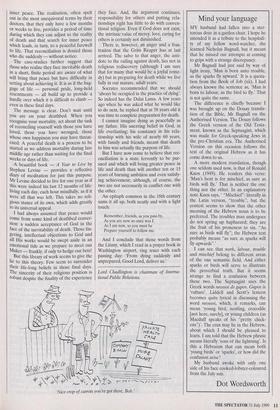Mind your language
MY husband had fallen into a ster- torous doze in a garden chair. I hope he intended it as a tribute to the hospitali- ty of my fellow word-watcher, the learned Nicholas Bagnall, but it meant that he missed our attempts at coming to grips with a strange discrepancy.
Mr Bagnall had just said by way of light irony, 'Man is born unto trouble, as the sparks fly upward.' It is a quota- tion from the Book of Job (xii). I had always known the sentence as, 'Man is born to labour, as the bird to fly.' That is not quite the same.
The difference is chiefly because I was brought up on the Douay transla- tion of the Bible, Mr Bagnall on the Authorised Version. The Douay follows the Greek version of the Old Testa- ment, known as the Septuagint, which was made for Greek-speaking Jews in the pre-Christian era. The Authorised Version on this occasion follows the text of the original Hebrew as it has come down to us.
A more modern translation, though one seldom used now, is that of Ronald Knox (1949). He renders this verse: `Man's bent is for mischief, as sure as birds will fly.' That is neither the one thing nor the other. In an explanatory note Knox says, "Mischief': literally in the Latin version, "trouble", but the context seems to show that the other meaning of the Hebrew noun is to be preferred. The troubles man undergoes do not spring up haphazard; they are the fruit of his proneness to sin. "As sure as birds will fly"; the Hebrew text probably means "as sure as sparks will fly upwards".'
I can see that work, labour, trouble and mischief belong to different areas of the one semantic field. And either sparks or birds will serve to illustrate the proverbial truth. But it seems strange to find a confusion between these two. The Septuagint uses the Greek words neossoi de gupos. Gupos is `vulture'. Liddell and Scott's lexicon becomes quite lyrical in discussing the word neossoi, which, it remarks, can mean 'young bird, nestling, crocodile [not here, surely], or young children (as Macduff speaks of his "pretty chick- ens")'. The crux may lie in the Hebrew, about which I should be pleased to learn. I am told that the Hebrew phrase means literally 'sons of the lightning'. Is this a Hebraism that can mean both `young birds' or 'sparks', or how did the confusion arise?
My husband awoke with only one side of his face cooked-lobster-coloured from the July sun.
Dot Wordsworth


























































 Previous page
Previous page